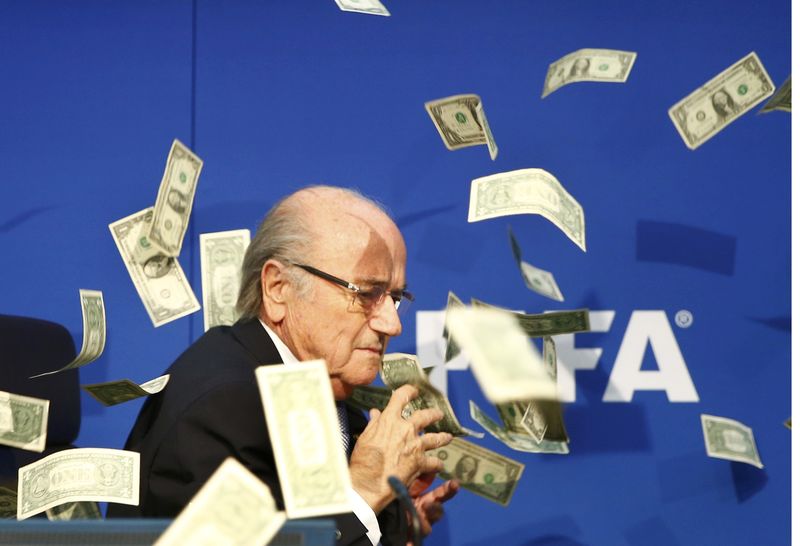By Simon Evans
ZURICH (Reuters) - FIFA President Sepp Blatter on Monday announced a reform taskforce to try to leave the troubled body in better shape when he finally stands down after a new leader of world football is elected in February.
Blatter, 79, tried to look ahead at executive meeting that set the date for the election as Feb. 26 and sketched out the reforms - but the corruption scandal that erupted in May once again overshadowed plans that critics blasted as insufficient.
As he sat down to begin a news conference at FIFA's Zurich headquarters, Blatter, head of the body since 1998, was showered with fake dollar bills by a suited prankster.
Clearly shaken, Blatter left the room while staff cleared up the paper from the floor.
British media identified the protester, who was taken away by police, as comedian Lee Nelson, real name Simon Brodkin, who has been involved in similar pranks and posted a picture of the incident on the Twitter (NYSE:TWTR) feed of one of his alter egos.
World football bosses will be hoping the organisation can draw a line under the past months with the election of a new leader.
While Blatter himself has not been charged with any wrongdoing, his vice president, Jeffrey Webb, appeared in a U.S. court on Saturday and pleaded not guilty to charges of racketeering conspiracy, wire fraud and money laundering.
The 50-year-old Cayman Islands national is among nine football officials and five marketing executives charged by the U.S. Justice Department with allegedly exploiting the sport for their own gain through bribes of more than $150 million over 24 years.
Blatter said his decision to quit in June, despite having won a fifth-term four days earlier, was to help FIFA while it was under attack.
"There was pressure coming from different groups, attacking FIFA. I had to do something for FIFA, not for me. My mission now is to defend the institution (of) FIFA. I can defend myself. I don't need help. But FIFA (does)," Blatter said.
He described May's events as a "tsunami", saying: "I am still alive, the waves of the tsunami have not taken me away."
PLATINI SUPPORT
Despite speculation he would renege on stepping down, he insisted he would not be standing as a candidate and said he may work in radio after his retirement from FIFA.
UEFA president Michel Platini has emerged as the early frontrunner ahead of the vote which will be held at a special elective congress in Zurich.
Platini has yet to decide whether to run but a source close to the European governing body said he had received encouraging support from leaders of four of the six regional confederations that make up FIFA.
Blatter's news conference was short on details of the new taskforce, but a statement from the organisation said it would be made up of 10 representatives of the confederations and be headed by an as yet unnamed "neutral chairman".
Blatter used the phrase "independent personality" to describe the head of the task force.
The newly created body has been charged with making "concrete and comprehensive" proposals for the next executive committee meeting on Sept. 24 and 15.
The executive committee also heard proposals from Domenico Scala, independent chairman of the Audit and Compliance Committee on term limits, enhanced "centralised integrity checks" and disclosure of salaries of FIFA leaders.
Asked twice to declare his own salary now, however, Blatter refused. "You can ask me that question all afternoon," he said.
The reforms, which come after similar proclamations following scandals in 2011, met with swift criticism from the Transparency International lobby group.
"Measures announced today by FIFA fall far short of what is required to clean out corruption at FIFA and its associations.
Instead of agreeing to a serious independent reform commission, FIFA announced yet another taskforce. This will not be sufficient to win back trust," it said in a statement.
The one change agreed by the executive committee is for World Cup bidders and contractors on World Cup hosting projects to satisfy U.N. "Principles on Business and Human Rights".

FIFA's choices of Russia and Qatar as hosts for the 2018 and 2022 World Cups has been criticised by human rights groups.